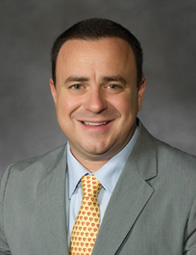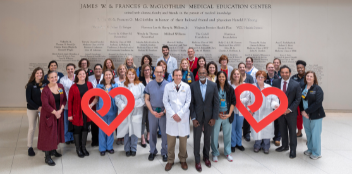Abbate, Van Tassell Receive $2.7 Million Grant
 Dr. Benjamin Van Tassell
Dr. Benjamin Van Tassell
 Dr. Antonio Abbate
Dr. Antonio Abbate
In June, the National Heart, Lung, and Blood Institute (NHLBI) awarded a $2.7 million grant to a research team led by Dr. Antonio Abbate, vice chair of the Division of Cardiology, and Dr. Benjamin Van Tassell, vice chair for clinical research in the VCU School of Pharmacy’s Department of Pharmacotherapy and Outcomes Sciences. The grant will allow them to further their promising studies using the anti-inflammatory drug anakinra, an Interleukin-1 (IL-1) blocker, in treating heart failure.
“This very important award from the NHLBI builds on 10 years of work done here at VCU Health,” said Abbate, the James C. Roberts, Esq. Professorship of Cardiology.
The body produces inflammation—marked by redness, heat, swelling and pain—as a natural and protective response to injury. In the case of cardiac patients, inflammation often occurs following a heart attack. But lingering, chronic inflammation is also linked to many diseases, including heart failure, he said.
In the past few years, Abbate and Van Tassell have used anakinra to target a specific type of inflammation caused by the IL-1 protein. Anakinra, an IL-1 blocker, was originally developed as a drug for rheumatoid arthritis.
Van Tassell and Abbate have narrowed their focus on anakinra in nine subsequent trials, mostly funded by the NHLBI and other National Institutes of Health agencies. In their 2016 study of 60 heart failure patients with a recent hospitalization, those who took anakinra achieved lower levels of inflammation and were able to exercise longer than those who did not. Over a six-month period, only one of the patients receiving the treatment had to return to the hospital. By contrast, nearly one-third of the patients who did not receive the treatment were hospitalized during the same time.
Their upcoming REDHART2 phase II clinical trial will involve 102 patients, followed for six months. The trial will be restricted to patients who have systolic heart failure, have been admitted to the hospital and discharged within the past two weeks, and show blood markers indicative of enhanced inflammatory response, he said.
“We will test the ability of anakinra to quench the inflammatory response, improve exercise capacity and possibly reduce rehospitalization after a hospitalization for decompensated heart failure,” said Abbate. The latter—typically accompanied by labored breathing, swelling of the legs or feet and fatigue—is an acute condition that reflects the sudden worsening of heart failure.
“The treatment for heart failure has dramatically improved over the past 50 years. We mark the 50th anniversary of heart transplantation at Pauley this year, which is an incredible milestone,” he said. “Unfortunately, for every patient with heart disease that is saved and for every heart-failure patient who survives the global burden of heart failure grows, and millions of patients experience symptoms and limitations related to it worldwide. Further improvements are urgently needed.”
The trial will enable Abbate to zero in on a solution for the many patients he sees in the hospital, again and again, suffering from decompensated heart failure.
“REDHART2 will be the largest single trial to date for our team,” he said. “We are looking forward to starting.”
Back to Autumn-2018

